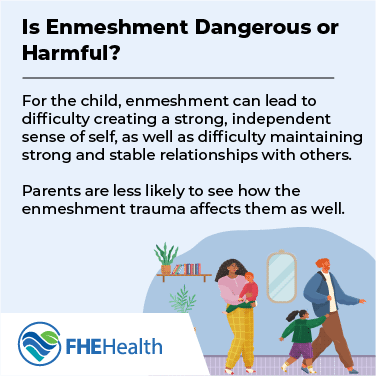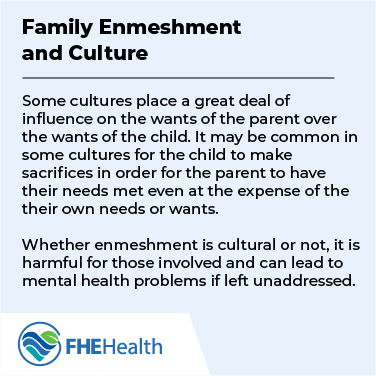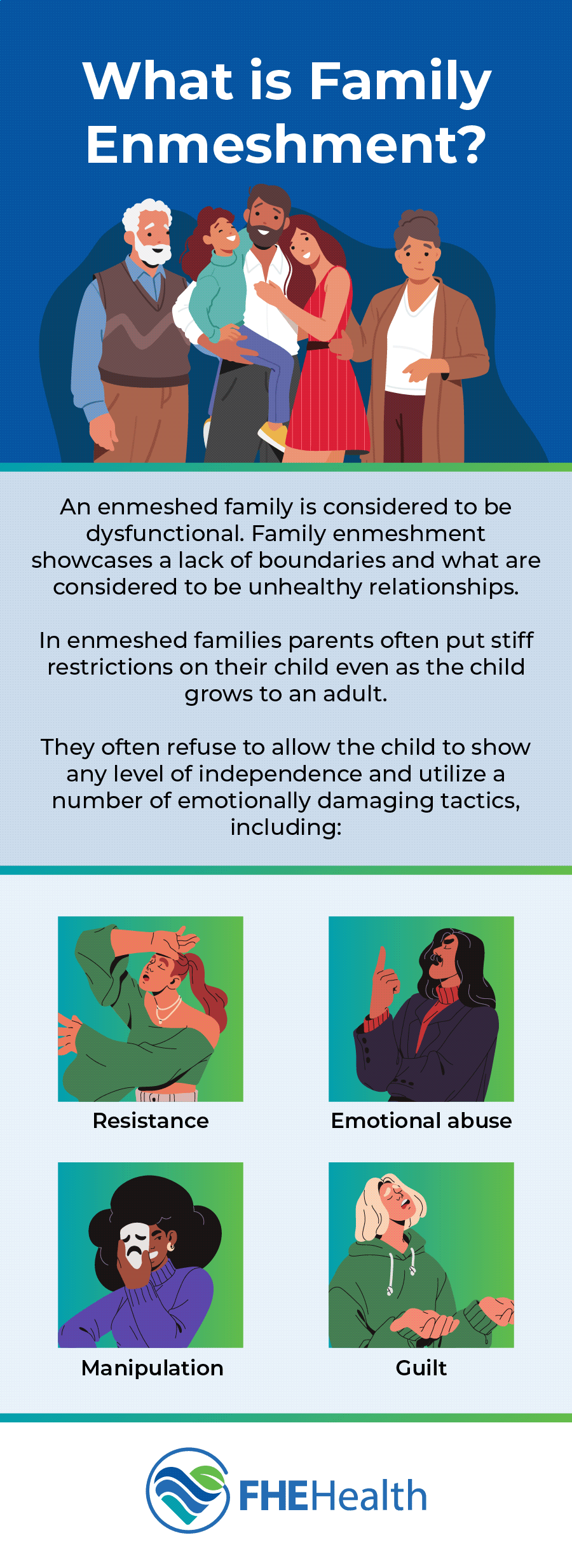
The concept of “family togetherness'” is often billed as the ideal. Families want to be close, they want to be supportive, and they want to enjoy each other’s company. All of these are great values to aspire to, but what happens when the family gets too close?
Yes, it is possible for a family to be too close. It’s called enmeshment, and occurs when family togetherness goes too far. It can often be a factor that complicates and even maintains illness or dysfunction that negative impacts all members of a family system.
What is Family Enmeshment?
An enmeshed family is considered to be dysfunctional. Specifically, family enmeshment showcases a lack of boundaries and what are considered to be unhealthy relationships. Signs of enmeshment appear most commonly in parent-child relationships, when the parent begins to execute undue influence on their child’s life.
While it is normal for a parent to have some influence over their child’s choices, this should begin to wane as the child gets older. In enmeshed families, however, the parent-child dynamic remains relatively consistent even as the child grows to an adult.
Even worse, with family enmeshment, the dynamic is much stronger still, with the parent often putting stiff restrictions on the child. They often refuse to allow the child to show any level of independence and utilize a number of emotionally damaging tactics, including:
- Resistance
- Emotional abuse
- Manipulation
- Guilt
Ultimately, the parent will make the most of the effects to get what they want from the child.
Is Enmeshment Dangerous or Harmful?
 Family enmeshment is absolutely harmful for both the child and the parent. While the effect on the child is easier to see, this type of dynamic can be difficult on both sides.
Family enmeshment is absolutely harmful for both the child and the parent. While the effect on the child is easier to see, this type of dynamic can be difficult on both sides.
For the child, enmeshment can lead to difficulty creating a strong, independent sense of self, as well as difficulty maintaining strong and stable relationships with others. They may also be in danger of suffering from the listed tactics above — resistance, emotional abuse, manipulation and guilt — as a result of the enmeshment.
For the parent, this type of relationship can also cause problems, though the parent is less likely to see how the enmeshment trauma affects them as well.
What Are the Signs of Enmeshment?
There are a number of different signs to look out for when it comes to enmeshed families. At first glance, the family may simply appear to be close-knit. Upon closer inspection, it will be obvious that the parent has a great deal of influence over the child, even into adulthood.
This type of family will always turn inward in times of struggle or difficulty and will not reach out to those outside the family group. Children are often taught that what they want is secondary to doing what is expected of them. They also experience a lack of privacy and a lack of boundaries, and their parents tend to be overly involved.
Signs of enmeshment are hard to notice at first; parents and even others within the family may dismiss concerns by saying that the family is just close. However, these families have an entirely different level of closeness that is harmful to all involved.
The difference between a close family and an enmeshed family is in the way that they shirk individuality and the desire of family members to prioritize their own needs. Families that are close in a healthy way will support their members in expressing their individuality and personal needs. They will also provide support to members in difficult times and offer unconditional love.
Enmeshed families, on the other hand, tie love and support into doing what the parent wants. The child is often shamed or experiences guilt and manipulation for trying to express themselves individually or trying to take care of their needs. The child may also be blamed for the feelings or needs of another.
Is it All About the Culture?
 It is common for some cultures to experience enmeshment more than others. This can happen frequently with immigrant families, for example, where first-generation citizens may experience intense pressure from immigrant parents.
It is common for some cultures to experience enmeshment more than others. This can happen frequently with immigrant families, for example, where first-generation citizens may experience intense pressure from immigrant parents.
Some cultures place a great deal of influence on the wants of the parent over the wants of the child. And it may be common in some cultures for the child to make sacrifices in order for the parent to have their needs met. This may even require the child to sacrifice their own needs or wants “for the good of the family”.
In all of these situations, however, whether enmeshment is cultural or not, it is harmful for those involved and can lead to mental health problems if left unaddressed.
Addressing Family Enmeshment
Therapy and treatment are instrumental in working through and overcoming enmeshment trauma. No matter how long this type of trauma has been allowed to continue, the child is entitled to support and assistance to grow and develop into their own person.
Enmeshment can inflict a number of lasting effects on a child, including:
- Feeling the burden of parental care and support
- Feeling overwhelmed with their responsibilities, especially to the family
- Feeling disloyal for wanting to pursue their own wants or needs
- Feeling disloyal for starting or continuing personal relationships
- Always seeking approval and support from the parent, even when those feelings are toxic
- Constant seeking of “commitment-free” situations
Enmeshment trauma can affect children in different ways. Some may be able to bounce back, while others may struggle with finding a sense of self or working through the feelings of doing what they want in complete contradiction to what the parent wants. This type of situation can make it difficult for a child to grow up and live out their life, especially following the eventual loss of the parent.
Being Your Own Person
You may consider seeking professional help to deal with signs of enmeshment and enmeshment trauma. A health care professional can help you identify the signs and work through the resulting traumas to create a healthy and fulfilling life. Whether you are the first to experience signs of enmeshment or you’re looking to to stop the cycle, a certified professional can help.
FHE Health can meet you where you are, working with you to understand your enmeshed family and how it’s affected you growing up. If you are experiencing family enmeshment or its side effects, you can contact us to find out more, or reach out to our team anytime with questions on any other mental health concerns. Recovery is on the horizon — take your first steps today.







